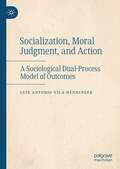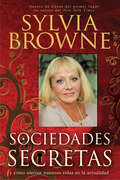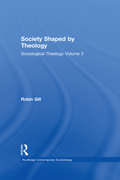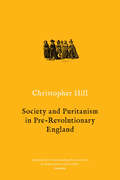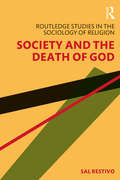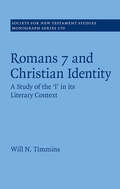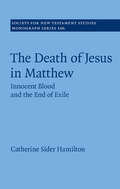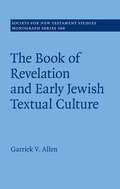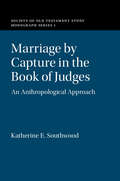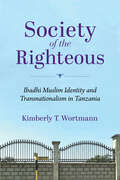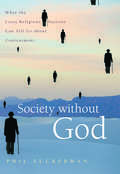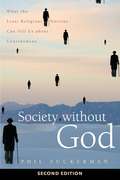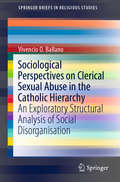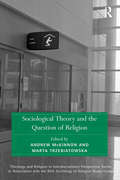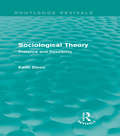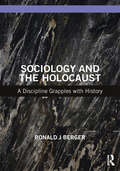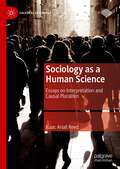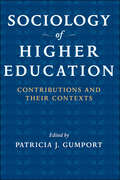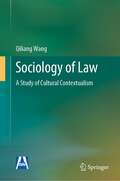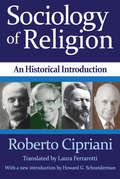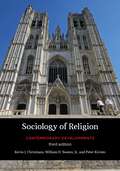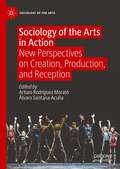- Table View
- List View
Socialization, Moral Judgment, and Action: A Sociological Dual-Process Model of Outcomes
by Luis Antonio Vila-HenningerHow does culture affect action? This question has long been framed in terms of a means vs ends debate—in other words, do cultural ends or cultural means play a primary causal role in human behavior? However, the role of socialization has been largely overlooked in this debate. In this book, Vila-Henninger develops a model of how culture affects action called “The Sociological Dual-Process Model of Outcomes” that incorporates socialization. This book contributes to the debate by first providing a critical overview of the literature that explains the limitations of the sociological dual-process model and subsequent scholarship—and especially work in sociology on “schemas”. It then develops a sociological dual-process model of moral judgment that formally explains Type I processes, Type II processes, and the interaction between Type I and Type II processes. The book also expands sociological dual-process models to include a temporal dimension—the "Sociological Dual-Process Model of Outcomes". Finally, the book integrates a theory of socialization into the sociological dual-process model and creates empirical indicators that confirm Vila-Henninger’s theorization and contribute to the literature on measures of dual-process models.
Sociedades Secretas: Y Cómo Afectan Nuestras Vidas En La Actualidad
by Sylvia BrowneFresh from the success of her book Secrets & Mysteries of the World, Sylvia Browne now writes about the clandestine world of secret societies. Sylvia’s research, combined with her amazing communication with her spirit guide Francine, has uncovered the fact that many secret societies affect the lives of each of us every day . . . whether it be in the areas of religion, politics, economy, government, crime, or other worldwide influences. She shares her knowledge of the conspiracies, coverups, long-held secrets, misinformation, and power manipulations of secret societies in both the past and present and how they can affect us today and in the future. From the mysterious secrets of the Knights Templar to the powerful secret societies of the modern age, Sylvia takes us on an amazing journey to explore and unearth the truth. She discusses the amazing influence of the Freemasons on our Founding Fathers, the influence of religion on earth-shaking secrets and terrorism, the agenda of powerful secret societies for a "New World Order," and much more. Sylvia explores it all, and even gives us information on a powerful secret society that no one has even heard about. So lock your windows and doors and read about these societies and their secrets . . . some will really raise the hair on your neck!
Society Shaped by Theology: Sociological Theology Volume 3 (Routledge Contemporary Ecclesiology)
by Robin GillOver the last thirty years a number of theologians have been using aspects of sociology alongside the more traditional resources of philosophy. In turn, sociologists with an interest in theology have also contributed to an interaction between theology and sociology. The time is right to revisit the dialogue between theologians and sociologists. In his new trilogy on Sociological Theology, Robin Gill makes a renewed contribution to the mapping of three abiding ways of relating theology and sociology, with the three volumes covering: Theology in a Social Context; Theology Shaped by Society; Society Shaped by Theology. Society Shaped by Theology explores the possibility that theological concepts may sometimes still be influential in the modern world. It follows in the tradition of Max Weber, arguing that theological virtues and debates can at times be transposed, wittingly or unwittingly, into society at large. Robin Gill examines the unusual instance of the public debate about Honest to God in the 1960s, but then turns to the current debate about faith and social capital, adding fresh and unexpected evidence. Finally Gill argues that bioethics in the public domain, especially on global issues such as AIDS, can be enriched and deepened by a judicious use of theological virtues.
Society and Puritanism in Pre-revolutionary England (Peregrine Bks.)
by Christopher HillThe role of Puritanism in the formation of modern BritainIn order to understand the English Revolution and Civil War we need to understand Puritanism. In this classic work of social history, Professor Hill shows Puritanism as a living faith, one that responded to social as well as religious needs. It was a set of beliefs that answered the hopes and fears of yeomen and gentlemen, merchants and artisans in the tribulations of early modern Britain, a time of extraordinary turbulence. Over this period, Puritanism, he shows, was interwoven into daily life. He looks at how rituals such as oath-taking, the Sabbath, bawdy courts and poor relief, became ways to order the social upheaval. He even offers an explanation for the emergence of the seemingly paradoxical - the Puritan revolutionaries.
Society and the Death of God (Routledge Studies in the Sociology of Religion)
by Sal RestivoThis book advances the "strong" programme that sociology and anthropology provide a scientific foundation for arguing that God and the gods are human creations. Contending that religion is one – but not the only – way to systematize and institutionalize the moral order of a society, the author argues that religion reflects the fundamental human need for belonging and the social function of compassion. As such, our transcendental and supernatural ideas are really concerned with our everyday lives in communities and, faced with the severity and immediacy of the global problems with which the world is confronted – existential threats – it is increasingly important to abandon delusions and correct our mistake in reference, not by eradicating religion, but by grounding it more explicitly in earthly matters of community, social solidarity, belonging, and compassion. A wide-ranging study of the roots, nature, and purpose of religion and theistic belief, Society and the Death of God will appeal to sociologists, social theorists, and philosophers with interests in the scientific study of religion and the role of religion in the life of humankind.
Society for New Testament Studies: A Study of the ‘I' in its Literary Context (Society for New Testament Studies Monograph Series #170)
by Will N. TimminsIn this book, Will N. Timmins provides a close rereading of Romans 7 within its literary-argumentative context and offers a fresh and compelling solution to the identity of the 'I' in this text. Challenging existing paradigms, which fail to provide both literary coherence and theological plausibility, he develops his own positive theory about the device. Along the way he also re-examines a number of key texts within the letter, which have hitherto not been given due weight within the scholarly discussion. This study offers a fresh and satisfying solution to one of the Bible's most notorious cruxes, and contributes to our understanding of the apostle Paul's thought. It will be of interest to all scholars and students within the fields of biblical studies and Christian theology.
Society for New Testament Studies: Innocent Blood and the End of Exile (Society for New Testament Studies Monograph Series #167)
by Hamilton Catherine SiderIn this book, Catherine Sider Hamilton introduces a new lens through which to view the death of Jesus in Matthew. Using the concept of 'innocent blood', she situates the death of Jesus within a paradigm of purity and pollution, one that was central in the Hebrew Scriptures and early Judaism from the Second Temple to the rabbis. Hamilton traces the theme of innocent blood in Matthew's narrative in relation to two Jewish traditions of interpretation, one (in Second Temple literature) reflecting on the story of Cain and Abel; the other (chiefly in rabbinic literature) on the blood of Zechariah. 'Innocent blood' yields a vision that resists the dichotomies (intra muros vs extra muros, rejection vs redemption) that have characterized the debate, a vision in which both judgment and redemption - an end of exile - may be true. 'Innocent blood' offers a new approach not only to the meaning of Jesus' death in Matthew but also to the vexed question of the Gospel's attitude toward contemporary Judaism.
Society for New Testament Studies: Jesus and the Temple
by Simon J. JosephMost Jesus specialists agree that the Temple incident led directly to Jesus' arrest, but the precise relationship between Jesus and the Temple's administration remains unclear. Jesus and the Temple examines this relationship, exploring the reinterpretation of Torah observance and traditional Temple practices that are widely considered central components of the early Jesus movement. Challenging a growing tendency in contemporary scholarship to assume that the earliest Christians had an almost uniformly positive view of the Temple's sacrificial system, Simon J. Joseph addresses the ambiguous, inconsistent, and contradictory views on sacrifice and the Temple in the New Testament. This volume fills a significant gap in the literature on sacrifice in Jewish Christianity. It introduces a new hypothesis positing Jesus' enactment of a program of radically nonviolent eschatological restoration, an orientation that produced Jesus' conflicts with his contemporaries and inspired the first attributions of sacrificial language to his death.
Society for New Testament Studies: The Book of Revelation and Early Jewish Textual Culture (Society for New Testament Studies Monograph Series #168)
by Allen Garrick V.The Book of Revelation and Early Jewish Textual Culture explores the relationship between the writing of Revelation and its early audience, especially its interaction with Jewish Scripture. It touches on several areas of scholarly inquiry in biblical studies, including modes of literary production, the use of allusions, practices of exegesis, and early engagements with the Book of Revelation. Garrick Allen brings the Book of Revelation into the broader context of early Jewish literature, including the Dead Sea Scrolls and other important works. Arguing that the author of the New Testament Apocalypse was a 'scribal expert, someone who was well-versed in the content of Jewish Scripture and its interpretation', he demonstrates that John was not only a seer and prophet, but also an erudite reader of scripture.
Society for Old Testament Study: Marriage by Capture in the Book of Judges
by Southwood Katherine E.In this book, Katherine E. Southwood offers a new approach to interpreting Judges 21. Breaking away from traditional interpretations of kingship, feminism, or comparisons with Greek or Roman mythology, she explores the concepts of marriage, ethnicity, rape, and power as means of ethnic preservation and exclusion. She also exposes the many reasons why marriage by capture occurred during the post-exilic period. Judges 21 served as a warning against compromise- submission to superficial unity between the Israelites and the Benjaminites. Any such unity would result in drastic changes in the character, culture, and values of the ethnic group 'Israel'. The chapter encouraged post-exilic audiences to socially construct those categorised as 'Benjaminites' as foreigners who do not belong within the group, thereby silencing doubts about the merits of unity.
Society of the Righteous: Ibadhi Muslim Identity and Transnationalism in Tanzania (Framing the Global)
by Kimberly T. WortmannAlthough the rule of the Omani sultanate in Tanzania came to an end following the Zanzibar Revolution in 1964, the legacy of its empire still exists today, along with its distinctive religious identity. The Ibadhi Muslims of Omani descent, who are neither Sunni nor Shi'a, have used a message of tolerance and harmonious coexistence to spread their beliefs across North and East Africa in a post-revolution and post-independence era.In Society of the Righteous, Kimberly T. Wortmann explores how the Ibadhi-Omani community in Tanzania has engaged in charitable activities, cooperation within the Muslim community, and economic development, despite facing suspicions of foreign influence and elitism. The focus is on the Istiqaama Muslim Community, an international charity network established in Oman and Tanzania in 1995. This ethnographic and transregional study documents the strategies employed by the "People of Truth and Righteousness" to preserve their unique religious practices and beliefs.Society of the Righteous moves beyond the typical discussions on global Muslim religion and politics, such as tradition versus modernity, conflicts between different branches of Islam, and the global war on terror. Instead, it explores the intricacies of a religious community whose significance has been obscured by the limitations of area studies paradigms. It illuminates the complexities of religious identity, transnational networks, gender relations, and the power of collective memory in shaping narratives of belonging, cultural preservation, and change in an increasingly interconnected world.
Society without God
by Phil Zuckerman"Silver" Winner of the 2008 Foreword Magazine Book of the Year Award, Religion CategoryBefore he began his recent travels, it seemed to Phil Zuckerman as if humans all over the globe were "getting religion"--praising deities, performing holy rites, and soberly defending the world from sin. But most residents of Denmark and Sweden, he found, don't worship any god at all, don't pray, and don't give much credence to religious dogma of any kind. Instead of being bastions of sin and corruption, however, as the Christian Right has suggested a godless society would be, these countries are filled with residents who score at the very top of the "happiness index" and enjoy their healthy societies, which boast some of the lowest rates of violent crime in the world (along with some of the lowest levels of corruption), excellent educational systems, strong economies, well-supported arts, free health care, egalitarian social policies, outstanding bike paths, and great beer.Zuckerman formally interviewed nearly 150 Danes and Swedes of all ages and educational backgrounds over the course of fourteen months. He was particularly interested in the worldviews of people who live their lives without religious orientation. How do they think about and cope with death? Are they worried about an afterlife? What he found is that nearly all of his interviewees live their lives without much fear of the Grim Reaper or worries about the hereafter. This led him to wonder how and why it is that certain societies are non-religious in a world that seems to be marked by increasing religiosity. Drawing on prominent sociological theories and his own extensive research, Zuckerman ventures some interesting answers.This fascinating approach directly counters the claims of outspoken, conservative American Christians who argue that a society without God would be hell on earth. It is crucial, Zuckerman believes, for Americans to know that "society without God is not only possible, but it can be quite civil and pleasant."
Society without God, Second Edition: What the Least Religious Nations Can Tell Us about Contentment
by Phil ZuckermanAn updated edition showcasing the social health of the least religious nations in the worldReligious conservatives around the world often claim that a society without a strong foundation of faith would necessarily be an immoral one, bereft of ethics, values, and meaning. Indeed, the Christian Right in the United States has argued that a society without God would be hell on earth.In Society without God, Second Edition sociologist Phil Zuckerman challenges these claims. Drawing on fieldwork and interviews with more than 150 citizens of Denmark and Sweden, among the least religious countries in the world, he shows that, far from being inhumane, crime-infested, and dysfunctional, highly secular societies are healthier, safer, greener, less violent, and more democratic and egalitarian than highly religious ones.Society without God provides a rich portrait of life in a secular society, exploring how a culture without faith copes with death, grapples with the meaning of life, and remains content through everyday ups and downs. This updated edition incorporates new data from recent studies, updated statistics, and a revised Introduction, as well as framing around the now more highly developed field of secular studies. It addresses the dramatic surge of irreligion in the United States and the rise of the “nones,” and adds data on societal health in specific US states, along with fascinating context regarding which are the most religious and which the most secular.
Sociological Perspectives on Clerical Sexual Abuse in the Catholic Hierarchy: An Exploratory Structural Analysis of Social Disorganisation (SpringerBriefs in Religious Studies)
by Vivencio O. BallanoThis book, as an exploratory sociological analysis, broadly examines the major structural factors which contribute to the social disorganization of the Catholic hierarchy as a clerical community, facilitating the persistence of clerical sexual abuse in the Catholic Church. Using some tenets of the social disorganization theory on crime and deviance as the overall theoretical framework with some perspectives from social organization, social network, and social capital, and secondary literature and qualitative data to support the arguments, it examines the (1) diocesan clergy’s social interaction, mutual support, and social control system in the hierarchical community, (2) connection between mandated clerical celibacy and clerical sexual abuse, and (3) the implication of the laity’s lack of empowerment and ecclesiastical authority to monitor and sanction clerical behavior. The Catholic hierarchy prides itself as a unified community of clerics under the Pope who shares the one priesthood of Christ. But the current clerical sexual scandals and the inability of bishops to adequately manage clerical sexual abuse cases make one wonders whether the Catholic clergy is indeed a cohesive and socially organized community which inhibits clerical sexual abuse. This book invites Church authorities, theologians, scholars, and lay leaders to understand the persistent clerical sexual abuse empirically and to come up with structural reforms which enhance the social network and social control systems of the Catholic hierarchy against clerical sexual misconduct and support victims.
Sociological Theory and the Question of Religion (Theology and Religion in Interdisciplinary Perspective Series in Association with the BSA Sociology of Religion Study Group)
by Andrew McKinnon Marta TrzebiatowskaReligion lies near the heart of the classical sociological tradition, yet it no longer occupies the same place within the contemporary sociological enterprise. This relative absence has left sociology under-prepared for thinking about religion’s continuing importance in new issues, movements, and events in the twenty-first century. This book seeks to address this lacunae by offering a variety of theoretical perspectives on the study of religion that bridge the gap between mainstream concerns of sociologists and the sociology of religion. Following an assessment of the current state of the field, the authors develop an emerging critical perspective within the sociology of religion with particular focus on the importance of historical background. Re-assessing the themes of aesthetics, listening and different degrees of spiritual self-discipline, the authors draw on ethnographic studies of religious involvement in Norway and the UK. They highlight the importance of power in the sociology of religion with help from Pierre Bourdieu, Marx and Critical Discourse Analysis. This book points to emerging currents in the field and offers a productive and lively way forward, not just for sociological theory of religion, but for the sociology of religion more generally.
Sociological Theory: Pretence and Possibility (Routledge Revivals)
by Keith DixonFirst published in 1973, this book is concerned with the question of whether Sociology is, or ought to be, a theoretical science. Keith Dixon argues that the pretence to the theoretical is a hindrance to the development of the field of Sociology, which devalues significant empirical work by giving status to research findings only in so far as they relate to often arbitrary theoretical concerns. Dixon addresses the historical dimension in the explanation of human nature and rational action. This reissue will be of particular value to students and academics with an interest in the empirical and theoretical methodology applied to Sociological research.
Sociology and the Holocaust: A Discipline Grapples with History
by Ronald J BergerFor some time the conventional wisdom in the interdisciplinary field of Holocaust studies is that sociologists have neglected this subject matter, but this is not really the case. In fact, there has been substantial sociological work on the Holocaust, although this scholarship has often been ignored or neglected including in the discipline of sociology itself. Sociology and the Holocaust brings this scholarly tradition to light, and in doing so offers a comprehensive synthesis of the vast historical and social science literature on the before, during, and after of the Holocaust—a tour d’horizon from an explicitly sociological perspective. As such, the aim of the book is not simply to describe the chronology of events that culminated in the deaths of 6 million Jews but to draw upon sociology’s “theoretical toolkit” to understand these events and the ongoing legacy of the Holocaust sociologically.
Sociology and the Holocaust: A Discipline Grapples with History
by Ronald J BergerFor some time the conventional wisdom in the interdisciplinary field of Holocaust studies is that sociologists have neglected this subject matter, but this is not really the case. In fact, there has been substantial sociological work on the Holocaust, although this scholarship has often been ignored or neglected including in the discipline of sociology itself. Sociology and the Holocaust brings this scholarly tradition to light, and in doing so offers a comprehensive synthesis of the vast historical and social science literature on the before, during, and after of the Holocaust—a tour d’horizon from an explicitly sociological perspective. As such, the aim of the book is not simply to describe the chronology of events that culminated in the deaths of 6 million Jews but to draw upon sociology’s “theoretical toolkit” to understand these events and the ongoing legacy of the Holocaust sociologically.
Sociology as a Human Science: Essays on Interpretation and Causal Pluralism (Cultural Sociology)
by Isaac Ariail ReedSociology as a Human Science is a set of foundational, wide-ranging and updated essays from Isaac Ariail Reed. Gathered together for the first time with a new introduction, they articulate a distinct perspective on concept and method in social science. Reed writes about realism and positivism, postmodernism and empiricism, mechanisms and causality, and power and history, developing thereby an understanding of the key debates out of which 21st-century sociology has developed. Carefully considering all manner of arguments in metatheory and epistemology and moving towards a program of interpretive explanation focused on culture and power, Reed places sociology at the center of debates about knowledge production across the humanities and social sciences. His reconstructive approach, positioned “after the posts” (poststructuralism, postmodernism, and postcolonialism) provides a way for interpretive sociology to provide analytically sound, theoretically extensive, and empirically rich understandings of social life.
Sociology of Higher Education: Contributions and Their Contexts
by Patricia J. Gumport&“Outstanding . . . it presents a comprehensive state of the field, and it explores the role of sociological research in guiding higher education practice.&” —Choice In this volume, Patricia Gumport and other leading scholars examine the sociology of higher education as it has evolved since the publication of Burton Clark&’s foundational article in 1973. They trace diverse conceptual and empirical developments along several major lines of specialization and analyze the ways in which wider societal and institutional changes in higher education have influenced this vital field of study. In her own chapters, Gumport identifies the factors that constrain or facilitate the field&’s development, including different intellectual legacies and professional contexts for faculty in sociology and in education. She also considers prospects for the future legitimacy and vitality of the field. Featuring extensive reviews of the literature, this volume will be invaluable for scholars and students of sociology and higher education.
Sociology of Law: A Study of Cultural Contextualism
by Qiliang WangThis book, based on extensive ethnographic material, analyzes the complex relationships between the law and various social controls, helping to answer the question of how social order is formed. Formal law exists in a web of complex structures and meanings. Accordingly, legal study must take into account multiple types of order, allowing us to understand in depth the strengths and weaknesses, reasonable and absurdity, and successes and failures of the law. In addition, the interactions of numerous actors shape the structure and context of the law. Exploring these aspects—while also highlighting diverse informal/non-state norms that influence day-to-day social practices, and which have never been replaced by modern laws—the book offers an insightful resource for all readers who are interested in the practice of Chinese law or in the connections between culture, society, and the law.
Sociology of Religion for Generations X and Y
by Adam PossamaiGenerations X and Y are plugged into the contemporary world of consumption, popular culture, and the internet. These generations treat knowledge and belief as a more flexible concept, often focusing on the practical rather than the theoretical and often drawing on conflicting sources in both popular and cyber culture. Their approach to religious belief and practice requires a new way of studying the sociology of religion. 'Sociology of Religion for Generations X and Y' examines key world religions - Buddhism, Christianity and Islam - as well as newer religious groups, such as Scientology, New Age, Witchcraft and online communities such as Jediism and Matrixism. The book covers a range of key concepts: secularisation and modernisation, re-enchantment, the 'McDonaldisation' of society, and the easternisation of the west. Each chapter opens with a case study from popular culture or the internet which takes the reader to the heart of the topic being discussed. Employing both classical sociological theory and contemporary critical theory, 'Sociology of Religion for Generations X and Y' explains where contemporary religion and spirituality are coming from, where they are now, and where they are going.
Sociology of Religion: An Historical Introduction (Annual Review Of The Sociology Of Religion Ser. #7)
by Roberto CiprianiSociology of Religion represents a documented introduction to the history of sociological thought as applied to religious phenomena. It examines both the substantive and functional definitions of religion that are more open, pluralistic, and not inscribed in a single explanatory horizon or within a single confessional perspective. The contributors' concerns are carefully written to show all sides of the argument. Roberto Cipriani argues for the simple definition that the sociology of religion is an application of sociological theories and methods to religious phenomena. Historically, close ties between sociology and the sociology of religion exist. The slow and uneven development of theory and methods affects the sociology of religion's development, but the latter has also benefited from increasing precision and scientific validity. Other sociological writers agree and disagree about different approaches. Some assume it is a militantly confessional or anti-confessional; others remain neutral within their work.
Sociology of Religion: Contemporary Developments
by Peter Kivisto William H. Jr. Swatos Kevin ChristianoThis third edition of Sociology of Religion introduces students to key principles in the sociological understanding of religion, with revisions and updates throughout. The book offers an overview of the nature and function of religious institutions and practices, asking sociological questions about the changing role of religion in today’s “post-traditional” world.
Sociology of the Arts in Action: New Perspectives on Creation, Production, and Reception (Sociology of the Arts)
by Arturo Rodríguez Morató Alvaro Santana-AcuñaThis edited collection carries out an extensive coverage of the sociology of arts’ most characteristic thematic areas (production, creation, the artwork, and reception) across an important range of artistic fields, from the most traditional to the more unusual. It makes an argument for the theoretical creativity and empirical expansion that characterizes the study of contemporary sociology of the arts. Such creativity is present in the increasingly predominant approach to a sociology of the arts in action, in all areas of inquiry within the discipline. The range of theoretical paradigms evoked is rich, analysing several of the most important theoretical frameworks currently handled in the discipline (Bourdieu, Becker, Peterson, ANT), and combining them with the works of many other influential contemporary specialists (De Nora, Hennion, Lamont, Menger and Born et al.). The book also establishes links to less known theoretical frameworks and some from different fields including economic sociology,microsociology, ethnomethodology, semiotics, and cultural history. The volume argues that Spanish-speaking scholars are now at the forefront of new developments in the field of the sociology of the arts, and is the first effort to gather research by these influential Spanish-language scholars in a single volume for an English-language audience.
